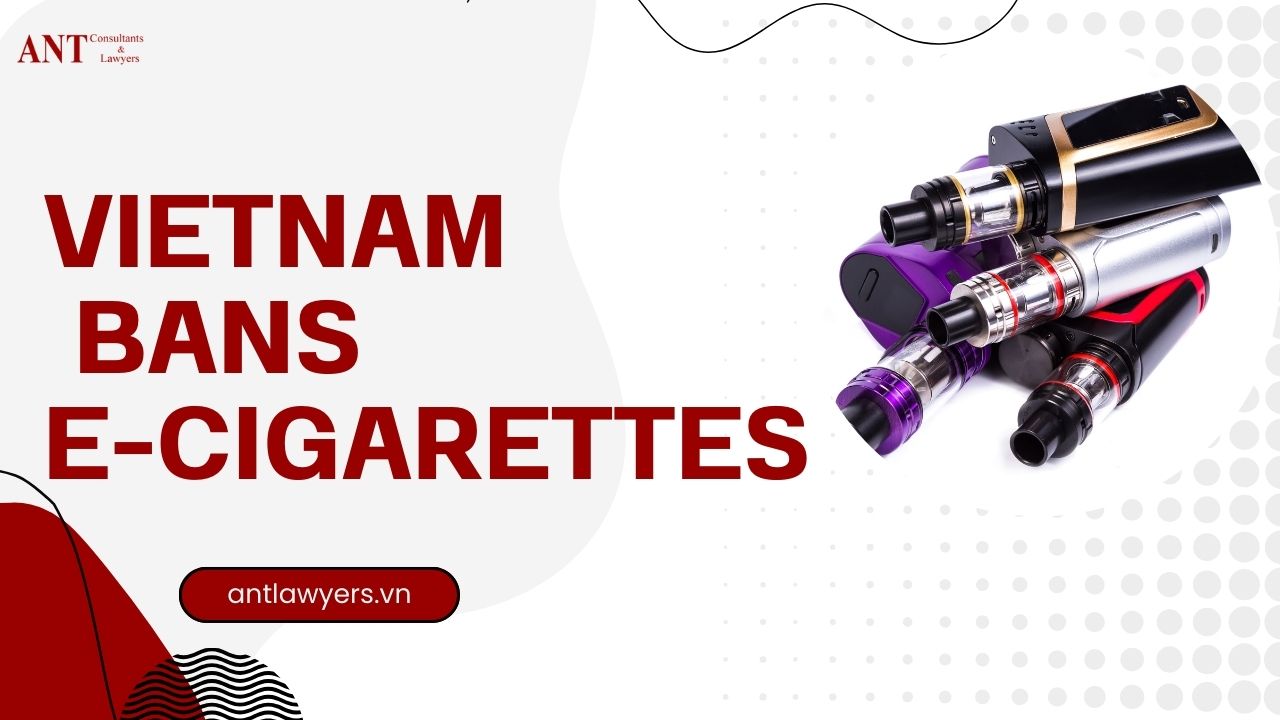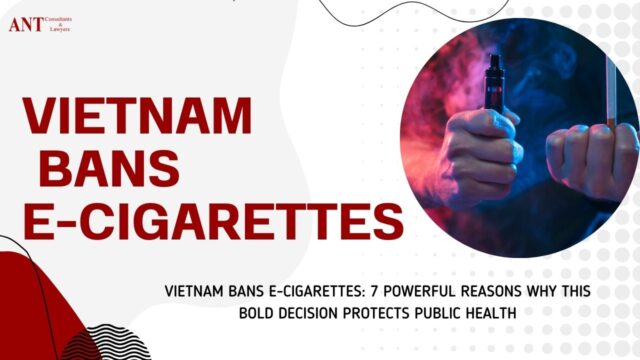Vietnam Bans E-Cigarettes: 7 Powerful Reasons Why This Bold Decision Protects Public Health


The decision by Vietnam to ban e-cigarettes is a turning point in public health policy. As the popularity of e-cigarettes surges among young people and their associated health risks become more apparent, the Vietnamese government’s resolute action is both timely and necessary. This ban encompasses production, trade, importation, advertising, and use of e-cigarettes, aiming to safeguard future generations and align with international tobacco control standards.
Understanding the Context: Why Vietnam Bans E-Cigarettes
E-cigarettes have been marketed as a safer alternative to traditional smoking, but their appeal has extended far beyond adult smokers seeking cessation aids. With sleek designs and enticing flavors, these products have captured the attention of young people globally, including in Vietnam. According to reports, the usage of e-cigarettes among Vietnamese youth has been rising, sparking concern among health officials, parents, and educators.
Key Aspects of the Ban
Vietnam’s comprehensive approach to banning e-cigarettes includes:
- Prohibiting all production, trade, and import of e-cigarettes.
- Criminalizing advertising and promotional activities.
- Banning the use of e-cigarettes in public spaces.
- Imposing strict penalties for violations, including fines and imprisonment.
This bold move not only demonstrates Vietnam’s commitment to protecting public health but also aligns with the Framework Convention on Tobacco Control (FCTC), an international treaty to combat tobacco use.
7 Reasons Why Vietnam Bans E-Cigarettes
- Protecting Youth From Nicotine Addiction
The flavors and marketing strategies employed by e-cigarette companies have disproportionately targeted young people. Products marketed with flavors like mango, mint, and candy appeal to teenagers and mask the presence of nicotine—a highly addictive substance that alters brain development and increases susceptibility to addiction.
- Addressing Public Health Risks
While e-cigarettes are often touted as less harmful than traditional cigarettes, they still pose significant health risks. Research has linked e-cigarette use to respiratory problems, cardiovascular diseases, and even lung injuries in extreme cases. By banning e-cigarettes, Vietnam mitigates these risks, reducing the burden on its healthcare system.
- Preventing a New Epidemic
E-cigarettes have the potential to reverse decades of progress in tobacco control. Globally, the rise of e-cigarette use among non-smokers and ex-smokers has raised alarms about the re-normalization of smoking behaviors. Vietnam bans e-cigarettes to ensure this trend does not undermine its efforts to combat tobacco-related illnesses.
- Combating Illicit Trade and Smuggling
The unregulated market for e-cigarettes in Vietnam has facilitated the entry of counterfeit and low-quality products, posing additional health risks. A comprehensive ban simplifies enforcement and reduces the prevalence of smuggled goods.
- Aligning With Global Best Practices
Countries like Australia, Singapore, and Thailand have also implemented stringent regulations on e-cigarettes, citing their harmful impact on health and society. By joining these nations, Vietnam reinforces its reputation as a leader in public health policy in Southeast Asia.
- Responding to Community Concerns
Public opinion in Vietnam has increasingly favored stricter controls on tobacco products, including e-cigarettes. Parents, educators, and health professionals have voiced their concerns about the unchecked rise of vaping among youth. The ban reflects the government’s responsiveness to these societal demands.
- Upholding Vietnam’s Tobacco Control Commitments
As a signatory to the FCTC, Vietnam is obligated to adopt measures that reduce tobacco consumption and exposure to harmful products. The e-cigarette ban aligns with these commitments, reinforcing the nation’s dedication to public health.
Challenges in Enforcing the Ban
Illicit Trade
Despite the ban, Vietnam faces challenges in curbing the smuggling and sale of e-cigarettes. Given the high demand and profitability of these products, law enforcement agencies must adopt stringent measures to prevent black-market activities.
Online Advertising
Social media platforms remain a powerful tool for the covert promotion of e-cigarettes. Advertisers often target young people with appealing campaigns that evade traditional regulatory frameworks. Effective monitoring and intervention are essential to counter this challenge.
Public Awareness
While the ban is a significant step forward, its success depends on public understanding and compliance. Many individuals, particularly young users, may remain unaware of the health risks associated with e-cigarettes. Education campaigns are crucial to bridge this gap.
Comparing Vietnam’s Approach With Other Countries
Vietnam’s decision to ban e-cigarettes outright contrasts with the regulatory strategies of countries like the United States and the United Kingdom, where e-cigarettes are regulated but not banned. These nations allow the sale of e-cigarettes under strict guidelines, arguing that they may help adult smokers quit traditional cigarettes.
However, Vietnam’s stance is more aligned with nations like Singapore and Thailand, where e-cigarettes are banned to prevent their uptake among non-smokers and youth. This approach reflects Vietnam’s prioritization of prevention over harm reduction.
Public and Global Reactions
Domestic Reactions
The ban has been met with widespread support from parents, educators, and health professionals in Vietnam. Many view it as a necessary measure to protect the health and well-being of future generations.
International Praise
The World Health Organization (WHO) and other international bodies have lauded Vietnam’s proactive stance. Dr. Angela Pratt, WHO Representative in Vietnam, described the ban as a “bold and necessary step” to combat the rising threat of e-cigarettes.
The Future of Tobacco Control in Vietnam
Vietnam’s ban on e-cigarettes marks a significant milestone in its public health journey. However, the fight against tobacco is far from over. The government must continue to strengthen its enforcement mechanisms, enhance public education, and collaborate with international partners to ensure the success of this initiative.
Looking Ahead: A Bold Step for a Healthier Future
The decision to ban e-cigarettes demonstrates Vietnam’s unwavering commitment to protecting its citizens from the harms of tobacco products. By prioritizing prevention and aligning with global best practices, Vietnam sets an example for other nations grappling with the e-cigarette epidemic.
Vietnam bans e-cigarettes is an act to symbolize not just a policy decision but a broader commitment to safeguarding public health, ensuring a healthier, safer future for its people. This bold step resonates globally, reaffirming the importance of decisive action in the face of emerging public health challenges.
About ANT Lawyers, a Law Firm in Vietnam
We help clients overcome cultural barriers and achieve their strategic and financial outcomes, while ensuring the best interest rate protection, risk mitigation and regulatory compliance. ANT lawyers has lawyers in Ho Chi Minh city, Hanoi, and Danang, and will help customers in doing business in Vietnam.
How ANT Lawyers Could Help Your Business?
You could reach ANT Lawyers in Vietnam for advice via email ant@antlawyers.vn or call our office at (+84) 24 730 86 529
Recent Posts
6 Smart Moves to Improve ESG for Exporters in Vietnam and Unlock Global Trade Advantages
The World Is Watching You have the product. The factory is certified. Your logistics are…
7 Essential Truths to Open an Indirect Investment Account in Vietnam and Grow with Confidence
Do you want to invest overseas into Vietnam? Do you want to open an indirect…
5 Crucial Facts About ESG Laws in Vietnam That Could Save Your Business and Reputation
The Business World Is Changing Fast Rules are shifting. Expectations are rising. Eyes are watching. …
7 Powerful Reasons Why ESG Compliance in Vietnam Will Win You Trust, Growth, and Global Clients
Trust matters. Today, more than ever. Across industries, many companies are now being asked. directly…
7 Bold Reasons Why Tokenization in Vietnam Could Transform Your Future
Change is coming. Quietly. Digitally. Rapidly. Let’s imagine the situation, which assets are no longer…
Vietnam P2P Lending: 5 Bold Reasons Why Decree 94/2025 Could Empower Millions or Backfire?
A New Financial Chapter Begins in Vietnam One person lends. Another borrows. It’s that simple.…






